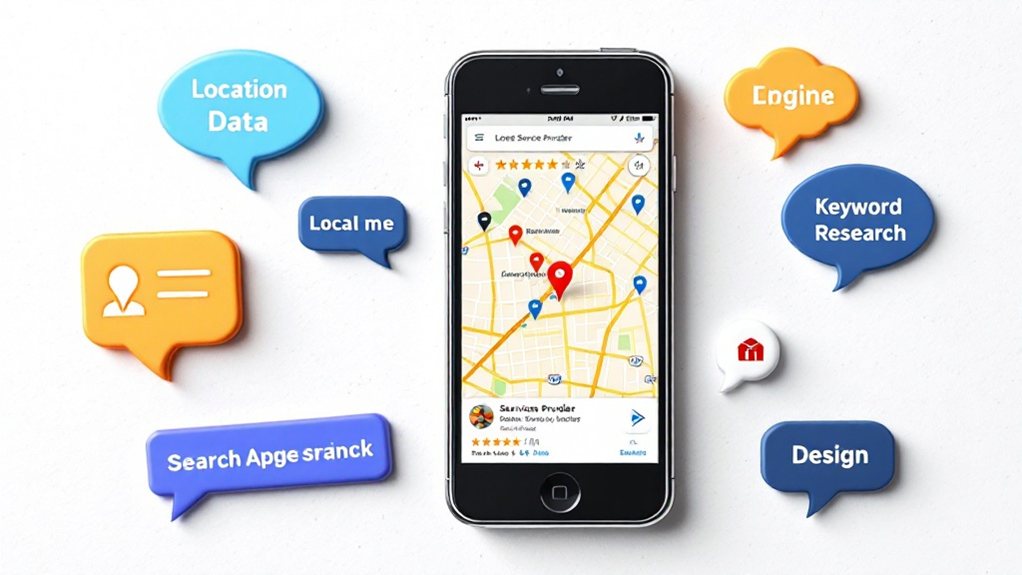To write service pages that rank for 'near me' queries, you'll need to optimize for proximity, relevance, and prominence. Ensure your Google Business Profile is accurate, create locally-tailored content, and leverage customer reviews and location-based keywords. Use SEO tools to research long-tail keywords and understand local search intent. Properly structure your pages and leverage user behavior to further boost visibility. Continue reading to explore these strategies in greater detail.
Optimizing for Proximity

Proximity is a crucial factor in local SEO, and you must understand its importance to optimize your service pages effectively. Proximity Optimization is essential for local businesses to attract customers from nearby locations. Ensure your Google My Business listing is accurate, as it's vital for proximity optimization. Create location-specific content to improve your rankings for nearby searches. Mobile optimization is essential, as users often conduct "near me" searches on their smartphones. Define your service areas clearly in your Google My Business listing and website content to signal your geographic relevance. Consistent NAP (name, address, phone), local directory listings, and positive reviews from nearby customers further enhance your proximity optimization efforts.
Enhancing Relevance Through Content

Crafting unique service pages is a crucial step in enhancing the relevance of your content. Tailor each page to local conditions and needs, discussing regional challenges and solutions. Use local-specific keywords to boost search engine understanding, and highlight community connections through local landmarks, events, and employee ties. Optimize your content with clear local signals, like the city name, phone number, and address. Showcase your business's first-party statistics and data to add unique insight into the business and demonstrate expertise and authority. Integrate local insights and testimonials to add credibility and relevance. Build local authority and trust by partnering with organizations, creating guest posts, and maintaining consistent online listings. Keep your service pages up-to-date and mobile-friendly to ensure users find the most relevant information.
Boosting Prominence With Online Reputation

Your online reputation can significantly boost your prominence. Regularly soliciting reviews from satisfied customers can amplify your positive feedback. Leverage positive testimonials from satisfied customers and maintain high star ratings to enhance your credibility and visibility in local search results. Consistently responding to both positive and negative reviews demonstrates your commitment to customer feedback.
Leverage Positive Testimonials
Why not leverage positive testimonials to boost your online reputation and prominence? Positive testimonials provide social proof and increase conversion rates. By highlighting these reviews, you enhance your business's visibility and credibility. Actively managing positive testimonials helps maintain a strong online reputation.
| Positive Testimonials | Impact |
|---|---|
| Social Proof | Reassure potential customers |
| Building Trust | Demonstrate commitment to satisfaction |
| Increased Conversion | Appear more trustworthy |
| Visibility Enhancement | Increase credibility on websites and social media |
Utilizing positive testimonials is a powerful strategy to improve your local SEO rankings and attract more customers. [A strong online reputation can attract new customers, build trust, and drive sales.
Maintain High Star Ratings
Maintaining high star ratings is paramount to boosting your online prominence. Consumers heavily rely on reviews, and businesses with ratings under 4 stars struggle to earn their trust. A high star rating is a powerful form of social proof. Leverage review calculators to determine the positive reviews required for your desired rating. Monitor review patterns to address negative themes and inform improvement strategies. Showcase your best reviews on your website to build credibility. Promptly resolve customer complaints and exceed expectations through personalized interactions. Streamline your operations, from shipping to customer support, to maintain a positive reputation. Optimizing your Google Business Profile and earning consistent local citations further enhance your visibility in 'near me' searches.
Incorporating Location-Based Keywords Strategically
When incorporating location-based keywords strategically, the use of long-tail keywords is crucial for targeting specific local audiences effectively. Keyword placement in title tags, meta descriptions, and headings improves search engine visibility. Effective location-based SEO tools, like SearchAtlas, provide detailed insights for keyword selection. Understanding local search intent is key to crafting relevant content that resonates with the target audience. Regularly tracking keyword performance helps in adjusting strategies according to market demands. Incorporating local vernacular helps content resonate more with local audiences.
Maintaining an Accurate Google Business Profile
How important is it to maintain an accurate Google Business Profile? Extremely crucial. A complete and up-to-date profile builds trust, visibility, and credibility. Verify your business listing, ensure NAP consistency, update operating hours, highlight key attributes, and communicate closures or holidays. Over half of Google Business Profile interactions produce website visits. Engage customers by responding to reviews, encouraging positive feedback, and using insights to improve services. Your profile's visibility on Google Maps and Local Pack boosts your local SEO, helping you rank higher. Enhance your profile with high-quality visuals, timely content, and geo-specific posts. Analyze performance data to make informed decisions. Maintaining an accurate Google Business Profile is essential for attracting, engaging, and converting local customers.
Structuring Service Pages for Maximum Impact
To maximize the impact of your service pages, you must structure them with a clear hierarchy and strategic content. Organize your website using a hierarchical structure to ensure seamless navigation. Craft optimized URLs with relevant keywords to improve search engine understanding and click-through rates. Properly utilize header tags to enhance readability for both users and search engines.
Incorporate long-form content that provides detailed information about your services to build authority and trust. Conversion optimization is crucial for converting visitors into customers Leverage visual elements like images and videos to break up text and enhance the user experience. Optimize page speed to deliver a fast and smooth experience, crucial for both user satisfaction and search rankings.
Optimizing Title Tags and Meta Descriptions
Now that you've structured your service pages for maximum impact, it's time to focus on optimizing your title tags and meta descriptions. Title tags and meta descriptions are crucial for attracting users and improving search visibility. Ensure your title tags are concise, incorporate relevant keywords, and avoid redundancy. Similarly, craft compelling meta descriptions that entice users to click. Leverage local keywords and geo-targeting to resonate with your target audience. Additionally, monitoring and analyzing the impact of location-specific meta tags is essential to refine and improve the local visibility strategy.
| Title Tag | Meta Description |
|---|---|
| Keep it under 60 characters | Aim for 155-160 characters |
| Include location-specific keywords | Integrate local keywords |
| Avoid unnecessary words | Write engaging, click-worthy content |
| Accurately describe the page | Accurately summarize the page's content |
| Optimize for mobile | Optimize for mobile |
Leveraging Structured Data for Local SEO
Structured data can significantly boost your local SEO efforts. Implement schema markup to convey critical business details to search engines, improving your chances of appearing in location-based searches. Structured data plays a vital role in ensuring local landing page performance in AI-driven platforms. Leveraging structured data can help you optimize for "near me" queries and enhance your visibility in the local pack.
Employ Schema Markup
Why is schema markup crucial for local SEO? Schema markup helps search engines better understand your business, leading to enhanced visibility and more relevant search results. This is especially important for "near me" queries, where schema data can indicate your location and services.
Consider these key benefits of schema markup for local SEO:
- Improved Visibility: Schema boosts your chances of appearing in local search packs, increasing your prominence.
- Relevant Results: By clarifying your business details, schema ensures you're served for the right location-based searches.
- Enhanced Customer Experience: Schema-powered rich snippets provide users with essential information, improving their search experience.
Optimizing your site with schema markup is a must for local businesses looking to rank higher and attract more qualified leads.
Optimize for Google Queries
Optimizing your Google Business Profile is key to ranking for "near me" queries. Ensure your business details are consistent across platforms. Use location-specific keywords in your profile description. List all served areas to enhance visibility. Promptly respond to reviews, both positive and negative. Regularly update your profile to maintain credibility. Leverage structured data like GeoCoordinates and LocalBusiness schema to provide precise location data and essential business facts. Embed event schema to highlight local events. Optimize for AI-powered and voice search to improve visibility in local results. Implement these strategies to make your service pages stand out in near me searches.
Creating Dedicated Service Area Pages
To create effective service area pages, you'll need to structure the content in a way that clearly communicates the local relevance of your services. This includes:
- Optimizing title tags and header structure to enhance search engine understanding
- Varying content length across pages to maintain uniqueness
- Incorporating multimedia elements like images, videos, and maps to engage users
Leveraging High-Intent User Behavior
Understanding user intent and search query analysis is crucial when aiming to leverage high-intent user behavior for your service pages. Analyze metrics like click-through rate, bounce rate, and dwell time to assess how well your content aligns with user intent. Use high-intent keywords that match transactional needs, such as "best services near me." Monitor user behavior patterns, as high bounce rates indicate poor content alignment, while long dwell times suggest strong engagement. Ensure your site's speed, mobile optimization, and content relevance enhance the user experience, as search engines prioritize content that matches intent, boosting its relevance and visibility.
